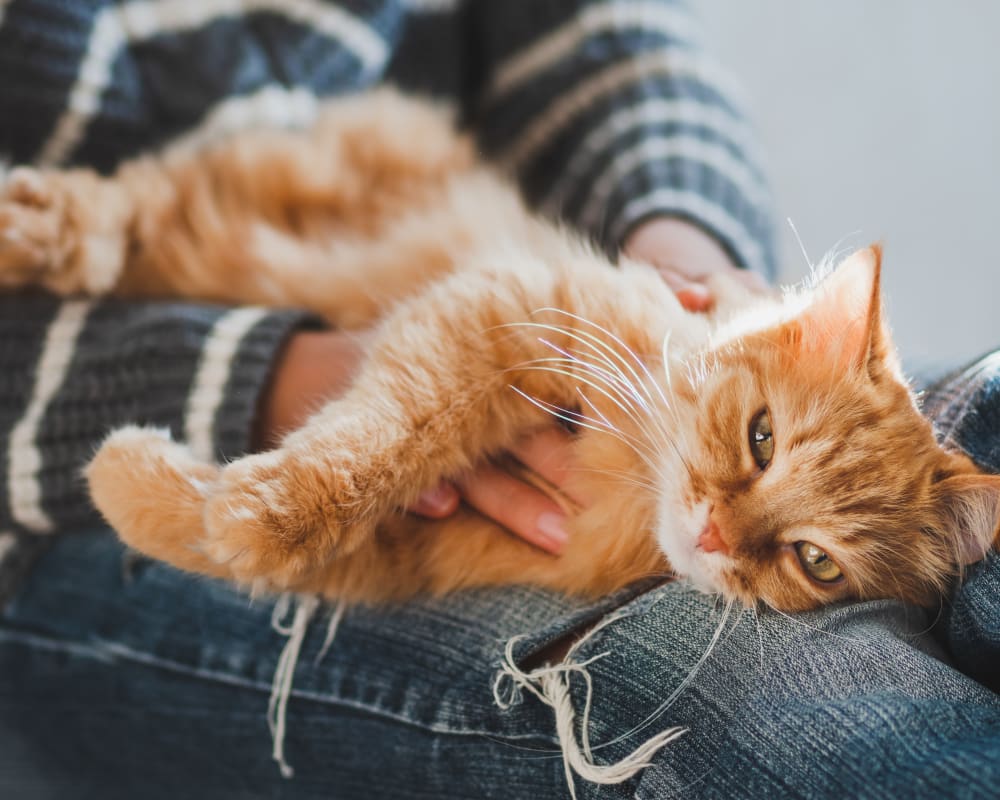Reproductive Care For Cats & Dogs
Spaying and neutering are common surgeries used to remove your cat or dog's reproductive organs, rendering them unable to reproduce. These preventive care procedures should be considered by every responsible pet owner.
Having your pet spayed or neutered can help them live a healthier, more contented life with fewer behavioural problems like aggression or roaming. Spaying and neutering can also significantly reduce the risk of certain types of infections and cancers.
For many people in Thornhill and the surrounding communities, one of the primary benefits of spaying or neutering their pets is to help prevent litters of unwanted dogs and cats. This can help reduce the population of homeless pets, as well as those in overcrowded animal shelters.

Neutering (Males)
Neutering, or orchiectomy, is a surgical procedure where the testicles are removed from male cats or dogs. This prevents them from being able to father any young.
Cats: Neutering your cat can help curb undesirable behaviours such as spraying, roaming and aggression towards other cats.
Dogs: Neutering your dog may help reduce animal aggression, 'humping' and attempts at escaping your home or yard.
Spaying (Females)
Spaying, technically known as an ovariohysterectomy, removes a female companion's reproductive organs. This procedure with prevent your cat or dog from becoming pregnant.
Cats: Spaying your cat may help prevent your kitty from escaping your home, roaming, yowling and urinating inappropriately.
Dogs: Having your female dog spayed ends their heat cycle and helps prevent pyometra (womb infection) and mammary tumours.
When to Spay & Neuter
Your veterinarian has a clear understanding of your companion's health and medical needs. Although we provide general spay and neuter age guidelines below, you should always discuss treatment with your veterinarian before making any decisions.
Cats
You can spay or neuter a kitten as young as six to eight weeks of age, however standard spay and neuter surgeries are most often performed when the kitten is between five and six months old.
That said, a healthy adult cat of any age can also be spayed or neutered.
Dogs
Puppies can typically be safely spayed or neutered when they are around six months old. However, some veterinarians have concluded that it is better to wait until the dog has reached sexual maturity before performing these reproductive surgeries.
Speak to your veterinarian to determine the best time to have your dog spayed or neutered and what to expect with the procedure and recovery.
How Spaying & Neutering Pets Benefits the Community
Overcrowded shelters often resort to euthanasia as a means of population control. Spaying and neutering help reduce stray overpopulation in animal shelters.
This allows shelters to allocate resources efficiently, focusing on providing better care and finding loving homes for the animals already in their care.
Additionally, with fewer stray animals, communities are safer and more pleasant for residents, mitigating conflicts between animals and humans.
Spaying & Neutering FAQs
For answers to more of your questions about spay and neuter procedures please read through the answers to these frequently asked questions from our clients.
-
How long will it take for my pet to recover from surgery?
Spaying and neutering procedures are routine surgeries. They are typically performed as day surgeries, allowing your cat or dog to return home with you at the end of the day.
Your pet's activity will need to be restricted for approximately 10 days, and a protective collar may need to be worn by your pet to prevent them from licking the incision.
You will also be requested to bring your pet in for a checkup approximately two weeks after surgery allowing your veterinarian to evaluate their healing.
-
Will my pet feel anything during the procedure?
General anesthesia will be used during the procedure, which means that your pet will not feel anything.
-
Will my pet gain weight after the procedure?
Your puppy or kitten will continue to grow to their full adult weight after the spay or neuter procedure, and this naturally includes some weight gain.
However, weight gain is not a standard side effect of the procedure itself.
-
How much will it cost to get my cat or dog spayed or neutered?
The cost of your pet's spay or neuter surgery depends on a wide variety of factors, including the size of your pet and their overall state of health. To get an accurate estimate of the cost of your pet's reproductive surgery, contact our Thornhill animal hospital today.
-
Will my pet need to stay in the hospital overnight?
While spay and neuter surgeries are usually performed as day surgeries, meaning that your pet goes home at the end of the evening, there may be rare cases where it may be necessary to keep a pet overnight.
If this is the case, our team will provide you with the next steps, including what to expect from our medical cat boarding if this is a suitable option for your furry friend.
When you come to our animal hospital to pick up your pet following surgery we will be sure to provide you with detailed instructions for at-home care.

